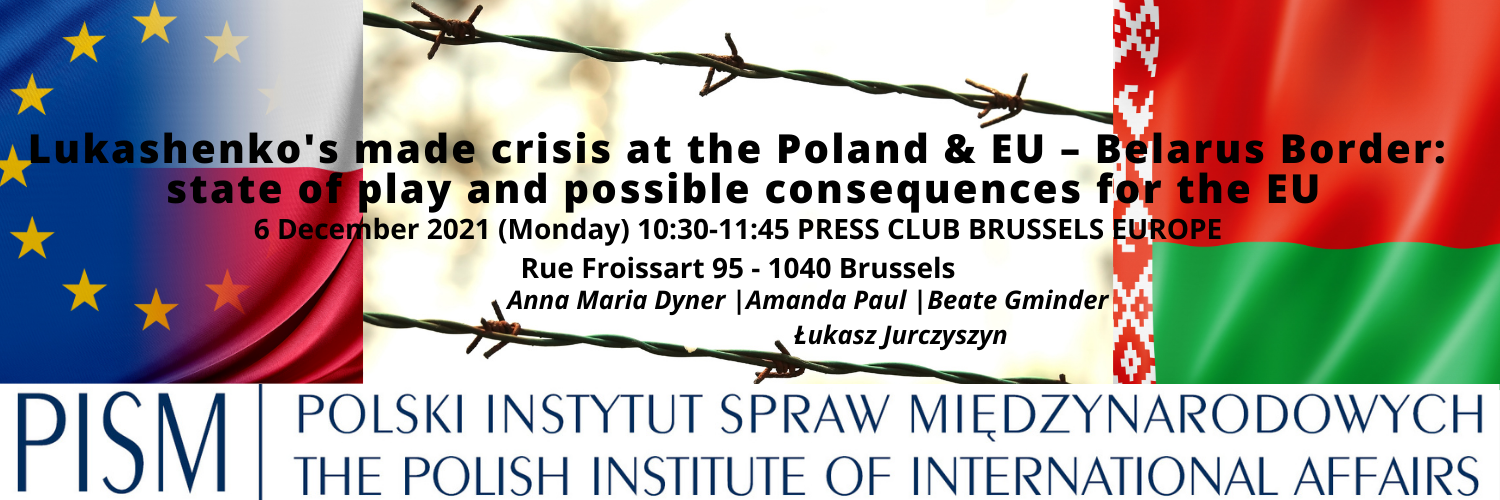Lukashenko's made crisis at the Poland & EU - Belarus Border: state of play and possible consequences for the EU
Zakończenie spotkania: 06.12.2021, 12:15
 PISM
PISM
The Polish Institute of International Affairs Brussels Office is pleased to invite you to the debate:
Lukashenko's made crisis at the Poland & EU – Belarus Border: state of play and possible consequences for the EU
Date: 6 December 2021 (Monday) 10:30-12:15
PRESS CLUB BRUSSELS EUROPE Rue Froissart 95 - 1040 Brussels
The situation on the border of Poland & EU and Belarus has been significantly worsening. The Belarusian services have been constantly leading (via air flights from such countries like Syria, Iraq) large numbers of migrants heading mostly Germany and the Netherlands (in Belarus there are from 7,000 according to the Belarusian authorities, up to 16,000 according to independent estimates) to the border, which has been intended to increase tensions and put pressure on the Polish as well as Lithuanian security services operating on the border. These actions which are aimed at provoking a serious humanitarian crisis and destabilising the security situation at the EU Eastern border - represent a test for Poland’s, EU’s and NATO’s ability to protect the border. As a result, the Polish government has decided to deplore at this stage around 20,000 of troops and to construct the reinforced wall on the border. Importantly, the EU has recently agreed to impose on Belarus new, wider raft of sanctions over this crisis. Moreover, the conflict is likely to continue and we can expect the approaching winter will worsen the gravity of the situation. Our panellists will reflect on the following aspects of how to understand this serious conflict on the EU border and how to deal with it:
- What precise kind of crisis, conflict are we facing? How to understand it? There are many different elements of it: hybrid attack by the Lukashenko’s regime on the Poland/EU border, very probably backed by Russia (as both countries have decided to deepen their integration); migration and humanitarian crisis.
- How to frame these events in broader current international and security context?
- As in the coming weeks, this type of actions of varying intensity is expected to continue - what should be an efficient short and long-term EU/NATO policy towards this crisis?
Agenda
10:30-12:15 Introductory remarks |debate among panellists | Q&A with the public Speakers:
- Anna Maria Dyner, Senior Research Fellow, the Polish Institute of International Affairs (PISM)
- Amanda Paul, Senior Policy Analyst, The European Policy Centre (EPC)
- Robert Pszczel, Member of the Polish Institute of International Affairs (PISM) editorial board of the Polish Diplomatic Review, former Polish diplomat and NATO official
- Michael Shotter, Director of Migration, Asylum and Visa
Chair:
- Łukasz Jurczyszyn, Director of PISM Brussels Office
This is an In-Person Event.
The debate will not be streamed or recorded.
RSVP by 3 December at brusselsoffice@pism.pl
Please note that, due to COVID19 restrictions, we only allow a limited number of guests to join the event. Once at full capacity, we will not be able to register you on the attendee list.
COVID19 Health Safety Measures during Debate:
Following the new Covid-19 measures taken by the Belgian government on Friday 26 November 2021, it will be mandatory to wear a mask in addition of the COVID19 pass for all indoor events. This measure is referred to as “Covid Safe Ticket Plus”.
